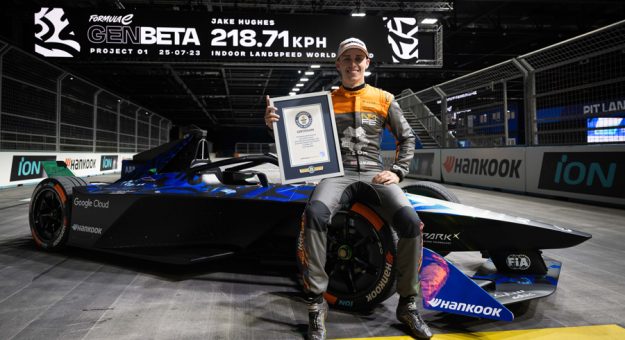LONDON — A revolutionary Formula E electric race car, the GENBETA, has smashed the indoor landspeed world record by more than 50 km/h, reaching a top speed of more than 218km/h (135.9 mph) inside a building in London.
The official Guinness World Records title was achieved by driver Jake Hughes of NEOM McLaren Formula E Team who competed with a rival in the ABB FIA Formula E World Championship, Mahindra Racing team driver Lucas di Grassi, to set the world record for the fastest speed achieved by a vehicle indoors.
The pair went head-to-head in the ‘Duels’ format used in qualifying for Formula E races to see who could set the fastest speed indoors, on just 346 meters of straight race track, using the same GENBETA car.
Neither driver had ever been behind the wheel of the GENBETA before, but both beat the previous world record of 165.2km/h (102.65 mph) set in February 2021 on all three of their practice runs before their official world record attempts.
Britain’s Jake Hughes was the first to go with three practice drives, instantly becoming the unofficial world record holder with his first run of 214.80 km/h. He then pushed that unofficial world record even further in his next two practice runs with recorded speeds of 215.05 km/h and 217.65 km/h.
Hughes, in his first season of racing in Formula E, set off on his fourth and official run. He achieved a top speed of 218.71 km/h earning him the world record title before the onlooking Lucas di Grassi entered the competition.
The Brazilian started strongly with a first run of 216.87 km/h, faster than Hughes’ initial practice, and looked to be on course to snatch the world record from his championship rival when his next practice clocked 217.92km/h before the third and final practice hit 218.18 km/h — a fraction off Hughes’ official world record.
Alas, it was not to be for the former Formula E champion who won the first-ever Formula E race in Beijing in 2014 and is the most successful driver in the history of the championship.
His fourth and official run achieved a top speed of 217.65 km/h meaning Hughes had won this unique Duel and was officially declared the holder of the Guinness World Records title as driver of the fastest-ever vehicle indoors.
The GENBETA car driven by both drivers to set the new world record featured a range of modifications to effectively “unlock” the specifications of the GEN3 race car. Introduced this season in Formula E, the GEN3 is the fastest, lightest, most powerful and efficient electric race car ever built.
With a top speed of more than 322 km/h (200 mph), the GEN3 is used by the 11 teams and 22 drivers in the ABB FIA Formula E World Championship.
The modifications to the GEN3 as part of the GENBETA project include:
- Enhanced battery power output of 400kW, up from 350kW in the GEN3, through the activation of the front powertrain kit in traction, delivering all-wheel drive for the first time in a Formula E car. The battery was charged by ABB, the title partner and official charging partner of the Championship.
- New, softer iON Race tyre compound allowing faster warm-up and better peak grip, developed by Hankook Tire, official tyre supplier of Formula E.
- 3D printed front wing endplates, wheel fins and a wind deflector with circular, more sustainable thermoplastic solutions developed by SABIC, principal partner of the ABB FIA Formula E World Championship, to optimise aerodynamics for enhanced straight line speed of the GENBETA.
- In addition to technology innovations on the GENBETA car, Google Cloud provided generative artificial intelligence (AI) for analysis of the drivers’ runs. Using their leading platform, Vertex AI, Hughes and Di Grassi were able to interpret real-time telemetry data to generate speed, power and grip recommendations. This gave them the ability to interact and converse with an interface to help fine tune their approach across their three attempts.
Experts from McKinsey & Company — led by its AI arm, QuantumBlack — built data and analytics components to create the driver interface that analyzed and queried data in real time through generative AI for the record attempt.
An adjudicator from Guinness World Records monitored the attempts to ensure the drivers met strict criteria. To set the official indoor landspeed record, the GENBETA car had to set off from a static start and come to a complete halt inside one continuous building structure.
The drivers started from a standstill inside the ExCeL London events arena and navigated a 130-degree turn at around 40 km/h before quickly accelerating along the 346m straight of the race track.
The indoor straight is part of the 2.09km track which is unique in world motorsport for extending inside and outside the 100,000 sq/m ExCeL London events arena in the Docklands area of east London which will host the final two races in the ABB FIA Formula E World Championship on Saturday and Sunday.
Their speed was measured by a sophisticated speed trap system at a fixed point just five meters before the drivers entered the braking zone — the length of track needed to come to a complete stop and remain inside the building.
The world record was set late night on July 25 after construction work to install the track and grandstands at the venue was completed for the day.
Former World’s Strongest Man, Eddie Hall, who has broken multiple weightlifting world records, was part of the driver support team sharing his personal insights and advice on mental preparation for a world record attempt.
